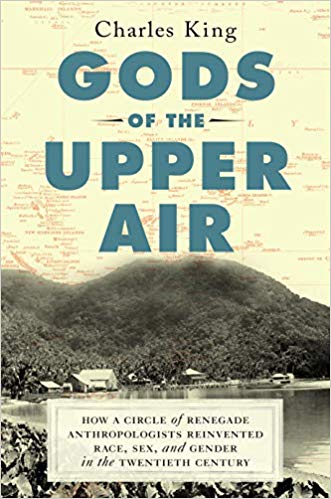Writing the life of a single intellectual can challenge any biographer. Somewhere the sardonic critic lays in wait, ready to complain about watching paint dry as the hapless writer tries to dramatize a mind working. Writing the lives of a group of intellectuals might seem to seriously exacerbate the problem.
Oh, how Charles King knocks that danger flat in Gods of the Upper Air. In philosophy, we talk of counterexamples. Gods of the Upper Air stands as a brilliant counterexample to the idea that the lives of intellectuals can’t glue one to the page.
To be sure, his cast of characters–all of whom were characters–makes much of the difference. The American anthropologists who studied, trained or worked under the great cultural anthropologist Franz Boas at Columbia, then took his message and the newly developing discipline in provocative directions—in King’s book they are Margaret Mead, Ruth Benedict, Ella Cara Deloria, and Zora Neale Hurston—lived unusually vivid lives, helping to shape American culture writ large. King, a Georgetown professor of international affairs and government who has shown before that he knows how to write a bracing narrative about complex cultural material (Odessa), expertly explains the theoretical issues involved without diminishing the human stories behind them.
And what stories they are: the love and mutual inspiration between Mead and Benedict; the courage and lasting accomplishment of Hurston as ethnographer and novelist; the groundbreaking work of Deloria, with Boas, in exploring Native American languages.
King makes big claims for his brilliant circle: that they steered the intellectual world away from biological determinism and racism toward recognition that cultural habits and traditions are contingent, not “natural.” As King puts it, his Boasian army largely won a “struggle to prove that—despite differences of skin color, gender, ability, or custom—humanity is one undivided thing.” Cultural relativity—a concept coined by Benedict, and understood as a descriptive notion rather than the notion that no way of life surpasses any other–should not divide us. Rather, it should bring us all together in the search for best practices, for enhanced ways of life, for pluralism and tolerance.
We know well enough that King’s subjects didn’t do what he claims for them alone, and maybe, looking at the world around us, some would argue that they didn’t do it at all. Yet King’s compelling book establishes that they pushed all the key issues of nurture versus nature in the right direction, upsetting ossified views about peoples, behaviors and values. Gods of the Upper Air lifts us from debased ways of looking at humanity, and gives five heroic anthropologists their historical due. That’s no small achievement.
— Carlin Romano



 Gods of the Upper Air: How a Circle of Renegade Anthropologists Reinvented Race, Sex, and Gender in the Twentieth Century by Charles King (Doubleday)
Gods of the Upper Air: How a Circle of Renegade Anthropologists Reinvented Race, Sex, and Gender in the Twentieth Century by Charles King (Doubleday)